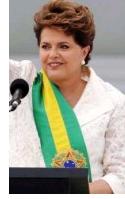Brazil's fiscal policy
How tough will Dilma be?
 The new government sets out to cool an overheating economy.
The new government sets out to cool an overheating economy.
On February 16th Brazil's new president, Dilma Rousseff, faced her first serious test in Congress, and passed it. Trade unionists, opposition politicians and even some members of her own coalition had tried to force through a big increase in the minimum wage. Instead, as Ms Rousseff wanted, it will rise from 510 reais ($305) a month to just 545 reais, barely outpacing inflation. Tough politicking behind the scenes by Antônio Palocci, her heavyweight chief of staff, together with the bait of unfilled senior jobs in the government, kept most members of her coalition in line. Her predecessor, Luiz Inácio Lula da Silva, did his bit too, telling his trade-union friends that seeking more money was "opportunism".
At first sight it seems an odd year for Ms Rousseff to be stingy. Brazil is booming, and in the private sector many workers are getting double-digit pay rises. Brazilians have grown used to big rises in the minimum wage. During Lula's eight years in office he boosted it by around 60% in real terms. That is one reason why income distribution has become less unequal in recent years, why Lula was so popular and, ultimately, why Ms Rousseff was elected last October.
The government's figure stuck to the letter of a deal brokered by Lula with the unions in 2006 to raise the minimum wage each year by the sum of the previous year's inflation and GDP growth from the year before that. In 2008 the economy shrank slightly. But if Ms Rousseff had wanted to be generous, she could have brought forward some of the whopping 13% that this formula is likely to award in 2012. The main reason for her parsimony was the impact on public-sector wages and pensions, which are linked to the minimum wage. All told, each real by which it rises costs the government 286m reais a year.
Ms Rousseff badly needs to get a grip on government spending. In 2008 government loans and tax breaks helped Brazil to escape the worst of the great recession. But rather than turning the taps off when the economy started growing again, the stimulus blended seamlessly into a pre-election binge. Last year the government missed its target of running a 3% primary fiscal surplus (ie, before debt payments). Without money from the sale of oil rights, and had it not funnelled government loans through the national development bank, it would have missed it by a mile.
The result is an overheating economy. Inflation, at 6%, is well above the Central Bank's target of 4.5%. The currency is painfully strong and unemployment is at its lowest since records began. The bank has already raised its benchmark rate once (to 11.25%) since Ms Rousseff took office, and more increases are expected soon. Officials hope that stricter rules on banking reserves and consumer credit will also help to dampen consumer demand.
The minimum wage will not be the only policy to feel the pinch. On February 9th Ms Rousseff said she would cut 50 billion reais, or around 2.5%, from the budget passed by Congress late last year. Her finance minister, Guido Mantega, promised efficiency savings and said expenses such as daily allowances and travel costs for civil servants would be squeezed. He asked the Fundação Getúlio Vargas, a university, to run a comb through departmental payrolls. Further details were delayed until after the vote on the minimum wage.
That delay is politically understandable: budget pork added by congressmen is a prime target for cutting. But the wait has also left analysts wondering where exactly the axe will fall. Efficiency savings of the type Mr Mantega set out are worthwhile, but will yield little more than loose change. Most of the budget consists of things that cannot be cut, at least not quickly, such as payroll, health-care and education spending. The previous time Brazil endured a fiscal tightening, after Lula took office in 2003, the government resorted to chopping public investment.
Ms Rousseff has already ruled out cuts not just in social programmes, such as Bolsa Família, a cash benefit that goes to 12m poor families, but also in infrastructure spending. She may resort to new taxes. But some analysts think she will turn to private investors to finance transport improvements. That would look like a U-turn: during the campaign she attacked her main opponent, José Serra, for his alleged privatising tendencies. But she is short of other options. Upgrades for roads and airports, which bear the marks of past spending cuts, are essential if Brazil is to avoid embarrassment when it hosts the World Cup in 2014 and the Olympics in 2016—and, more importantly, if it is to sustain economic growth in the long term.
(Published by The Economist - February 17, 2011)